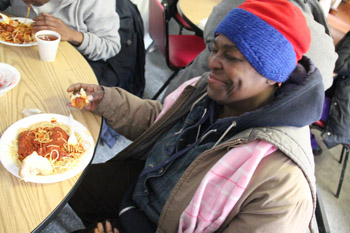
A visitor to Mercy Hospice, a Catholic Social Services facility for homeless women in Philadelphia, receives a hot meal Thursday, Feb. 13. (Sarah Webb)
Center City Philadelphia was a ghost town on Thursday, Feb. 13. With the area in the middle of the latest snowstorm of a particularly cruel winter, schools were closed, many offices including city offices were closed, public transportation was virtually non-existent, and people were urged to simply stay home.
There are some jobs that are just too important to close — police, firefighters, health care workers of course. Some others you might not expect. Project HOME’s Hub of Hope, tucked into a side passage of Philadelphia’s Suburban Station, is a case in point. It not only opened as scheduled on Feb. 13, it actually extended hours.
[hotblock]
Hub of Hope, which operates only in the winter months, provides services to the homeless men and women who congregate in the concourse as shelter from the bitter weather. Their needs are serious, and so vital that Coordinator Karen Orrick and Case Manager Carmena Green spent the night at Project HOME’s Fairmount Avenue headquarters just to be available for the 6 a.m. Hub opening.
Normal hours are those when the homeless are most likely to congregate in the station, from 6 to 10 a.m. and 6 to 8 p.m. On this day Orrick and Green would work straight through.
At first glance it just appears to be a place where the homeless can drop in, sit a while and drink endless cups of coffee or tea and cocoa if available. Actually it is as the name suggests – a hub where the homeless can go to be connected with various social services and shelters. Many of the regulars who come are shelter-resistant, emotionally unwilling to accept the services that can take them off the streets and out of the concourses.
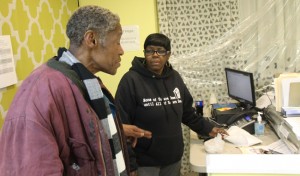
Carmena Green, case manager at Hub of Hope, helps a visitor navigate the social services system in Philadelphia for the care he needs.
“Some people are happy the way they are,” said Orrick. “They refuse to go to shelters and have a long history in the system. But shelter is the most pressing need and there are not always sufficient beds to fill the need.”
Hub of Hope’s target population is the long-term homeless. It connects them with a place where they can get a meal, a hot shower and somewhere warm to spend the night. For this they work especially closely with a shelter at Arch Street Methodist Church that is run by college volunteers and has 22 beds.
Long-term housing is usually a process involving paperwork often beyond the capacity of the people who need it, and that is really Hub of Hope’s real mission. In addition to staff case managers such as Green, there are medical and psychiatric professionals who determine the need and can sign off on the paper work, as well as perform triage at the small clinic in the back of Hub.
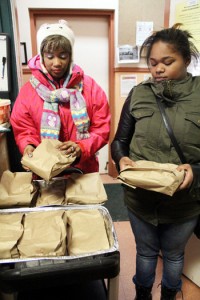
Some homeless women like April (left) and Beionca have too many belongings to come in and sit for a meal at Mercy Hospice, so they can take bagged lunches instead. (Sarah Webb)
“We are able to help most of the people who come here,” Green said.
It is really a group effort, with the various city and church-related agencies cooperating with one another, to see that these “least of the brothers and sisters” of the Lord receive necessary help.
In the month of January, Orrick estimates there were about 1,000 visitors to the Hub, with about 500 of them first-time.
Meanwhile there is that warm welcome and bottomless coffee pot, with everyone greeted with a smile and treated as if they are important, which they truly are.
Even for those who have obtained a place where they can sleep every night it serves a purpose, because many of the shelters are not open in the daytime.
“The Hub helped me; it found me a place to stay and to be off the street and sit down,” said Wesley, a regular visitor. “Today is rough because of the snow. Karen does a good job.”
“It’s fantastic, they are so accepting of everybody,” said Matt, another frequent visitor. “We have nothing and they share with us.”
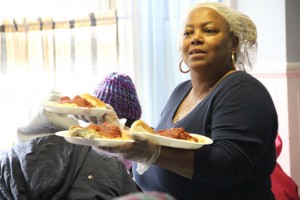
Elaine Nelson, food service manager at Mercy Hospice, dishes out hot plates of spaghetti and meatballs to guests at the CSS facility for homeless women and their children Feb. 13. (Sarah Webb)
Hub of Hope, which is now in its third winter season, is just one of the smaller ministries of Project HOME which was founded in 1989 by Religious Sister of Mercy Mary Scullion and Joan Dawson McConnon.
At its inception Project HOME was strikingly similar to what Hub of Hope’s mission is today — dedicated to providing relief to the homeless during winter weather.
Today, still under the leadership of Sister Mary and McConnon, it has grown to be a year-round nationally admired agency with 535 units of affordable housing for the previously homeless or a chronically poor population.
In addition to housing it provides the comprehensive medical and educational support programs needed to help those who are assisted to gain full self-sufficiency.
PREVIOUS: Catholic schools in city will close again Friday due to snow
NEXT: Happy Valentine’s Day, from Archbishop Chaput


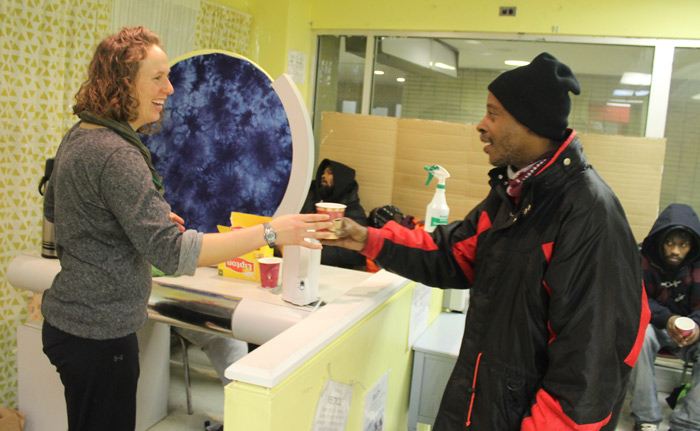
Share this story